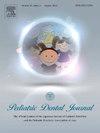Conservative management of Mycoplasma pneumoniae-induced Stevens Johnson syndrome in a paediatric patient: A case report
IF 0.8
Q4 DENTISTRY, ORAL SURGERY & MEDICINE
引用次数: 0
Abstract
Background
Stevens-Johnson Syndrome (SJS) is a rare and potentially life-threatening condition causing blistering and epithelial sloughing of the skin and mucous membranes. It is most commonly caused by infective pathogens or drugs.
Case presentation
A 14-year-old male patient presented with reduced oral intake following painful oral ulcerations secondary to a diagnosis of Mycoplasma pneumoniae-induced SJS. Treatment involved intravenous fluids, antimicrobials and analgesia, alongside atraumatic conservative management of the oral mucosa.
Conclusion
While there are no evidence-based treatment guidelines for Mycoplasma pneumoniae-induced SJS, conservative care is the cornerstone of management of paediatric presentations.
儿科支原体肺炎诱发史蒂文斯-约翰逊综合征的保守治疗:病例报告
背景史蒂文斯-约翰逊综合征(Stevens-Johnson Syndrome,SJS)是一种罕见的、可能危及生命的疾病,会导致皮肤和粘膜出现水疱和上皮脱落。病例介绍一名 14 岁的男性患者被诊断为肺炎支原体诱发的 SJS,继发疼痛性口腔溃疡后,口腔摄入量减少。治疗包括静脉输液、抗菌药和镇痛,以及对口腔粘膜进行无创伤的保守治疗。结论虽然肺炎支原体诱发的 SJS 尚无循证治疗指南,但保守治疗是儿科病例治疗的基石。
本文章由计算机程序翻译,如有差异,请以英文原文为准。
求助全文
约1分钟内获得全文
求助全文
来源期刊

Pediatric Dental Journal
DENTISTRY, ORAL SURGERY & MEDICINE-
CiteScore
1.40
自引率
0.00%
发文量
24
审稿时长
26 days
 求助内容:
求助内容: 应助结果提醒方式:
应助结果提醒方式:


